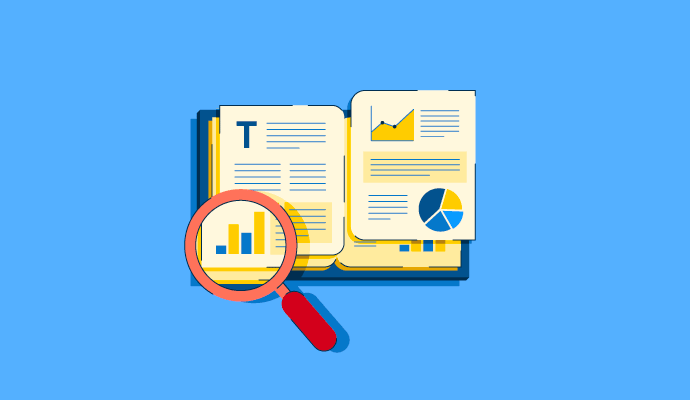What is reference management?
Reference management is a standard step in composing research projects. This software ensures the proper sources receive credit. Also known as citation management, it allows users to collect, store, and organize references or in-text citations. This software provides a complete set of tools that allows researchers to focus on delivering a cohesive and fully referenced research paper.
Many reference management tools help users create a personal resource library to organize all the resources they find and use for different projects. Reference management software helps create citations, bibliography pages, and reference lists with features that assist with citation generation in multiple styles. These citations and annotations can come from online articles, books, journals, and other sources. It’s as simple as inputting article or journal information and then copying and pasting the results into the research paper itself. The tools are commonly used for academic advising and are accessible to all ages.
The software can create citations in the desired style, automating the creation of bibliographies, endnotes, footnotes, or reference sections in research papers.
Want to learn more about Reference Management Software? Explore Reference Management products.
Is a reference manager the same as a citation manager?
The terms reference manager and citation manager are often used interchangeably. Both tools can automate the creation of footnotes, bibliographies, or reference sections in papers. They can create citations in different styles like MLA, APA, Chicago style, etc.
A reference (names and dates, page numbers, etc.) can be found in the body of a research paper. A citation also provides relevant information such as author name, date, title, edition, and, additionally, a digital object identifier (DOI).
The terms functionally perform the same action—acknowledging the work of other researchers and data points.
Who uses reference management software?
- Teachers: Many educators introduce reference management software into lessons so students have the knowledge and resources to execute their properly cited projects.
- Students: Students of all ages, from grade school to grad school, use reference management software to keep track of sources. Students sometimes use this software for multiple projects at a time.
- Academics and researchers: Individuals doing research in specific fields, such as medicine or academia, will often need good software to collect and monitor sources used in professional research projects.
- Librarians: Librarians use reference management software to organize and manage bibliographic information for their institutions' collections. This helps in maintaining accurate records of available resources.
- Corporate professionals: Corporate professionals, especially those involved in research and development, strategic planning, and market analysis, may use tools to organize and cite industry reports, market analyses, and relevant business literature.
- Healthcare professionals: Healthcare professionals, including doctors and researchers, use these tools to organize, annotate, and cite medical literature, research papers, and clinical studies in their work.
Why use reference management software?
Reference management software is the most straightforward and efficient way to track sources when working on a research project. It lets users create their own open-source libraries. As a result, users can save valuable time in the research process.
- Generating citations: Often, generating citations is as easy as inputting a link or ISBN and copying and pasting the results into a works cited page. It lets users choose the citation style and includes specific pages for quoting sources. As a result, this software can seamlessly generate citations for users.
- Collecting sources: Depending on how long a research project is, the user can utilize a couple of dozen sources. Reference management tools have features that let users organize sources in one place. This helps researchers keep track of when sources were found, an important feature as some projects might span over months or years.
- Increased accuracy and consistency: The software minimizes the risk of citation errors by automating the citation process and ensuring that references are formatted correctly according to the chosen citation style.
- Integration with word processors: Seamless integration with word processing software (such as Microsoft Word, Google Docs, or LaTeX) allows users to insert citations and generate bibliographies directly within their documents. This ensures proper formatting and reduces the chances of citation errors. It can be used on Windows, Mac, iOS, and Android operating systems.
Benefits of reference management software
Some of the key benefits of reference management software are:
- Efficient organization: Reference management provides a centralized location to store and organize citations, references, and other data. This helps users keep research materials in an accessible location.
- Document integration: Several reference management software are compatible with word processing tools such as Microsoft Word, thus facilitating easy integration within documents.
- Cross-platform accessibility: With availability of cloud storage options, reference data is available across multiple devices and locations. This also helps improve collaboration across teams.
- Time saving: Using tools helps quickly search, retrieve, and insert references into their work, thus helping with time management when compared to manual methods.
- Version history: Some reference management tools help track changes over time, thus providing a version history feature, enhancing accountability in collaborative research projects.
- Reduced errors: Automation tools help reduce the likelihood of citation errors, ensuring accuracy and adherence.
- Annotation and notes: Some tools offer features for note-taking and annotations, allowing users to write additional insights and information.
Reference management software features
Reference management software comes with various features; most features are standard across the board, though a couple of features are only found in certain tools.
- Citation generation: These tools can generate citations from multiple sources, including websites, books, academic journals, and more. This includes the generation of citations in multiple different styles, including MLA, APA, Chicago style, and more.
- Bibliography generation: Reference management tools can create a bibliography with a collection of sources, saving researchers time.
- Personal source library: Features in reference management software enable users to compile their collection of sources and references relevant to their specific needs. This allows easy access to sources viewed in the past. This quick reference tool saves time for researchers as many may use the same sources for multiple projects.
- Resource database: Many reference management tools connect to online databases full of resource materials, including journals, blogs, books, online publications, and more. Users can even search for reliable sources in the reference management tool.
- Synchronization: Since many reference management tools are websites or web applications such as Chrome and Firefox, their dynamic features and plugins allow users to access references from any device that can access web pages. This lets users access their research sources from their iPads, laptops, or other devices. A browser extension can be added to search engines to create a seamless workflow.
- Essay checker: This feature in some reference management software lets users submit their essays to a grammar and spell check. Some programs even scan for plagiarism by comparing submitted material to databases of source materials.
Software and services related to reference management software
- Cloud content collaboration software: Many reference tools come with features that integrate with cloud storage and collaboration software. This software allows information to be shared and accessed by larger groups of people.
- Document creation software: Reference management tools can integrate with document creation tools and word processors to transfer cited information from one location to another seamlessly. This can save time in the editing process, streamline the placement of citations in the research project, and improve overall document management.
Reference management software trends
- User-friendly interface: The ability to make the user experience easy and straightforward is a trend currently affecting the education technology world. In academia, there is a wide range of users—some have years of experience with various technologies, some have little to no experience.
- The common goal of education software is to allow users of all experience levels to successfully use these tools for their use case—creating catalogs, archiving, end notes, improving functionality, and more.
- Integration with collaborative platforms: Reference management software is increasingly being integrated with document collaboration platforms such as Microsoft Word. This trend enhances real-time collaboration among researchers, students, and professionals by allowing them to seamlessly share and discuss references within their collaboration environment.
- Cloud-based solutions: Cloud storage continues to gain popularity in the reference management space due to easy access, seamless collaboration, and automatic synchronization across devices. This trend aligns with the broader shift toward cloud computing in the software industry.

JaKayla D. Lathon
JaKayla is a Market Research Analyst at G2 specializing in real estate, education, and hospitality. Prior to joining G2, she worked in research and financial analysis in the private sector of Chicago, IL. JaKayla's result-driven nature helps her to combine G2's user data with the understanding of products and services in the market. In her free time, she enjoys traveling, gastronomy, and advocating for rescue dogs.

